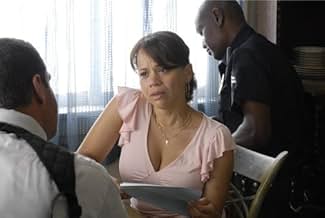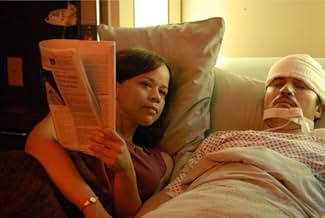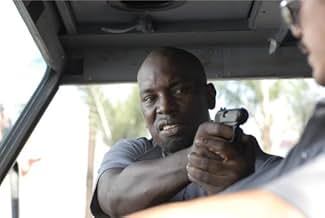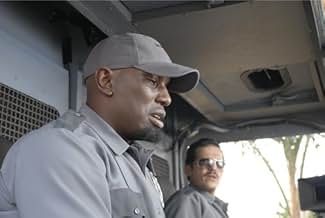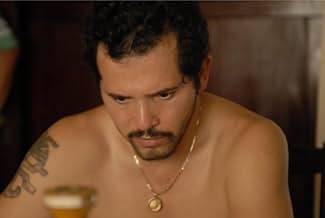AVALIAÇÃO DA IMDb
5,8/10
2,5 mil
SUA AVALIAÇÃO
Adicionar um enredo no seu idiomaAfter he's shot during a heist in East L.A., an armored truck driver wrestles with rehabilitation and tracking down the man who committed the crime.After he's shot during a heist in East L.A., an armored truck driver wrestles with rehabilitation and tracking down the man who committed the crime.After he's shot during a heist in East L.A., an armored truck driver wrestles with rehabilitation and tracking down the man who committed the crime.
- Prêmios
- 1 indicação no total
Jessica Steinbaum
- Rosey De La Pena
- (as Jessica Steinbaum-Lopez)
Taylor Gray
- Javy De La Pena
- (as Taylor Arthur Gray)
- Direção
- Roteiristas
- Elenco e equipe completos
- Produção, bilheteria e muito mais no IMDbPro
Avaliações em destaque
Drawing on clear influences from recent gritty, crime infused pieces such as 2000's Traffic and 2002's Narc, 2008 film The Take seems to have come and gone at a Canadian film festival before being banished to stores so as to increase profits on DVDs. It would seem there was nary a distributer at said Canadian festival willing to invest in Brad Furman's film; an overall shame, not a crying one but a shame none-the-less. The Take squeezes an amount of substance to do with male machismo; the tearing apart of a family unit; the sub-genre of the vigilante movie and the dealing of the aftermath of a heist plus all the crime drama conventions of mistrust between gangsters: honour amongst thieves, if you will, into 96 minutes. However, all too often these ideas jostle uncomfortably with one another – a persistent vying for power, a struggle between genres and sub-genres; content and study. This renders The Take less interesting than it might have been, but good enough to see in order to observe a moderately interesting, well acted independent American drama.
I think the film thinks it's more powerful and more affecting than it is in actualité. The tale is of a righteous man wronged, and the subsequent fall out it has on both his life and the lives of those around him. But for all the substance, for all the promise and for all the content; to have The Take boil down to a chase sequence on foot that, again, certainly thinks it has more of a sense of drama involved than it actually does, was just a mite disappointing and anti-climatic. Furman likes his visual tricks and gimmicks, with someone somewhere failing to realise that spectacle and visualness ought to have been secondary to this screenplay's agenda as gritty, Hispanic-American living conditions; seams in a family becoming unravelled; a man loosing his mind and sense of masculinity plus brutal shootings during a heist sequence were the order of the day. Furman tells the story with every trick in the book: the visual flair ingredient to the editing and camera work; the speeding up of footage; transitions and the hand-held camera technique on top of a number of scenes set in rooms that are close to all being entirely blacked out for sake of mood.
John Leguizamo plays the role of Felix De La Pena, a man of Hispanic descent living with his wife Marina (Perez) and their two kids in Los Angeles. De La Pena is a nice, upstanding man with a great deal of fondness for his family and the work he does. His large friend-base plus the fact his job sees him adopt a certain role of honour and trust in driving an armoured truck instills a sense of responsibility on top of the other positive conventions. But one day, things go spectacularly wrong when Tyrese Gibson's criminal Adell holds up the truck; has De La Pena drive it back to the HQ before robbing the place of its money and fatally wounding De La Pena. We've seen people shot following heists in films many-a time before, usually hard-bodied; no nonsense criminals in hard boiled neo-noirs, but they'd always get back up again after a brief lay off and plough on ahead, seeking money and revenge. The Take's sequence of wounding feels grainer than usual, De La Pena's pained reaction to his injuries are stark and cutting in ways that I've rarely felt a gunshot wound in a film before. The injury feels more painful than usual because of the film's delicate buildup of the victim: a well mannered; rather slim, though not necessarily 'weak', and supremely upstanding character in De La Pena. From here, a process of recovery for both the mind, body and soul begins as FBI agent Steve Perelli (Cannavale) hunts the wrong-doers.
It's here the film beds down for a long stretch of content similar to one another. De La Pena's sense of self vanishes and he gets a lot angrier a lot more often than usual, with Leguizamo really rather brilliantly portraying this new character: this fresher, more frothing at the mouth person. He installs security equipment in a fit of paranoia and undergoes a process of long recovery that sees him sense a once-present notion of 'manliness' now gone. Subsequently, he cannot make love to his wife; gets agitated as a result and seems to maintain this odd sense of being unable to really 'feel', as if to cry or get upset at the shooting is to fatally expel a sense of male machismo, with an ideology that might read something like: 'men don't cry - men get over this sort of thing'.
I wrote a while ago in an observation on a Finnish film from 2006 entitled Lights in the Dusk about the film's over-emphasising on the 'little-guy' in a big situation. In said film, a hapless turnkey is rendered fall guy so a gang of thieves can swipe some diamonds his job it is to contain. I cited 2001's sprawling and maddening heist flick 3000 Miles to Graceland, in which during a heist sequence at a casino, countless numbers of body guards and members of law enforcement are dispatched like the many nameless, faceless bad guys that pop up at you in certain video games, each one of them as fatally injured as the next. The Take, like said Finnish film, rejects the generic notion to follow those perpetrating the heist and instead opts for an unbeaten route down into the gloomy undergrowth of a victim of the shooting recovering. Needless to say, a lot of people that were shot in 3000 Miles to Graceland would've gone through what De La Pena goes through here – it's when these sorts of films dry up that we know we're in trouble. I notice that at the present time, The Take has a lower IMDb rating than 3000 Miles to Graceland: good grief!
I think the film thinks it's more powerful and more affecting than it is in actualité. The tale is of a righteous man wronged, and the subsequent fall out it has on both his life and the lives of those around him. But for all the substance, for all the promise and for all the content; to have The Take boil down to a chase sequence on foot that, again, certainly thinks it has more of a sense of drama involved than it actually does, was just a mite disappointing and anti-climatic. Furman likes his visual tricks and gimmicks, with someone somewhere failing to realise that spectacle and visualness ought to have been secondary to this screenplay's agenda as gritty, Hispanic-American living conditions; seams in a family becoming unravelled; a man loosing his mind and sense of masculinity plus brutal shootings during a heist sequence were the order of the day. Furman tells the story with every trick in the book: the visual flair ingredient to the editing and camera work; the speeding up of footage; transitions and the hand-held camera technique on top of a number of scenes set in rooms that are close to all being entirely blacked out for sake of mood.
John Leguizamo plays the role of Felix De La Pena, a man of Hispanic descent living with his wife Marina (Perez) and their two kids in Los Angeles. De La Pena is a nice, upstanding man with a great deal of fondness for his family and the work he does. His large friend-base plus the fact his job sees him adopt a certain role of honour and trust in driving an armoured truck instills a sense of responsibility on top of the other positive conventions. But one day, things go spectacularly wrong when Tyrese Gibson's criminal Adell holds up the truck; has De La Pena drive it back to the HQ before robbing the place of its money and fatally wounding De La Pena. We've seen people shot following heists in films many-a time before, usually hard-bodied; no nonsense criminals in hard boiled neo-noirs, but they'd always get back up again after a brief lay off and plough on ahead, seeking money and revenge. The Take's sequence of wounding feels grainer than usual, De La Pena's pained reaction to his injuries are stark and cutting in ways that I've rarely felt a gunshot wound in a film before. The injury feels more painful than usual because of the film's delicate buildup of the victim: a well mannered; rather slim, though not necessarily 'weak', and supremely upstanding character in De La Pena. From here, a process of recovery for both the mind, body and soul begins as FBI agent Steve Perelli (Cannavale) hunts the wrong-doers.
It's here the film beds down for a long stretch of content similar to one another. De La Pena's sense of self vanishes and he gets a lot angrier a lot more often than usual, with Leguizamo really rather brilliantly portraying this new character: this fresher, more frothing at the mouth person. He installs security equipment in a fit of paranoia and undergoes a process of long recovery that sees him sense a once-present notion of 'manliness' now gone. Subsequently, he cannot make love to his wife; gets agitated as a result and seems to maintain this odd sense of being unable to really 'feel', as if to cry or get upset at the shooting is to fatally expel a sense of male machismo, with an ideology that might read something like: 'men don't cry - men get over this sort of thing'.
I wrote a while ago in an observation on a Finnish film from 2006 entitled Lights in the Dusk about the film's over-emphasising on the 'little-guy' in a big situation. In said film, a hapless turnkey is rendered fall guy so a gang of thieves can swipe some diamonds his job it is to contain. I cited 2001's sprawling and maddening heist flick 3000 Miles to Graceland, in which during a heist sequence at a casino, countless numbers of body guards and members of law enforcement are dispatched like the many nameless, faceless bad guys that pop up at you in certain video games, each one of them as fatally injured as the next. The Take, like said Finnish film, rejects the generic notion to follow those perpetrating the heist and instead opts for an unbeaten route down into the gloomy undergrowth of a victim of the shooting recovering. Needless to say, a lot of people that were shot in 3000 Miles to Graceland would've gone through what De La Pena goes through here – it's when these sorts of films dry up that we know we're in trouble. I notice that at the present time, The Take has a lower IMDb rating than 3000 Miles to Graceland: good grief!
The Take (2007) is a film I recently watched on Tubi. The story follows an armored truck driver who is taken hostage during a heist, shot, and left for dead. After surviving, he struggles with mood swings, chronic pain, and relentless police interrogation. As his mental state deteriorates and his family life suffers, he decides he may need to solve the crime himself to regain control of his sanity.
Directed by Brad Furman (The Lincoln Lawyer), the film stars John Leguizamo (Moulin Rouge), Tyrese Gibson (Baby Boy), Rosie Perez (White Men Can't Jump), Bobby Cannavale (Boardwalk Empire), and Roger Guenveur Smith (Do the Right Thing).
The cast is impressive, and the acting exceeds expectations, especially from John Leguizamo and Rosie Perez, whose portrayal of a strained marriage felt authentic and emotional. The setup is solid, and Leguizamo's mental unraveling is well-executed. The family dynamics are a strong point and help ground the film. Tyrese's character, however, felt unnecessary, and the full-circle ending leaned a bit too far into the unbelievable. Still, the strong performances and engaging character arcs keep your attention.
In conclusion, The Take is a fairly average film but worth watching if you're in the mood for something a little different. I'd score it a 6/10.
Directed by Brad Furman (The Lincoln Lawyer), the film stars John Leguizamo (Moulin Rouge), Tyrese Gibson (Baby Boy), Rosie Perez (White Men Can't Jump), Bobby Cannavale (Boardwalk Empire), and Roger Guenveur Smith (Do the Right Thing).
The cast is impressive, and the acting exceeds expectations, especially from John Leguizamo and Rosie Perez, whose portrayal of a strained marriage felt authentic and emotional. The setup is solid, and Leguizamo's mental unraveling is well-executed. The family dynamics are a strong point and help ground the film. Tyrese's character, however, felt unnecessary, and the full-circle ending leaned a bit too far into the unbelievable. Still, the strong performances and engaging character arcs keep your attention.
In conclusion, The Take is a fairly average film but worth watching if you're in the mood for something a little different. I'd score it a 6/10.
The first time I saw this it blew me away. Since then it is probably one of my favourite movies of all time - why?
The stylishness, the grittiness, the acting and the passion.
You can tell that the people involved in the project really put their all into it and truly believed in telling a good story.
The story itself is, on the surface, something we've heard of before - typical heist gone wrong yada yada. But what makes this so special is the clever character study and the evolution we see in John Leguizamo's character. This is one of his best roles - the acting is top notch. Rosie Perez is equally impressive in her role and the passion bleeds from the screen.
You can tell Director Brad Furman wanted to stay true to the roots of the characters - he did go to Boyle Heights and filmed within the neighbourhoods wherein the story is set. On the commentary to the film he talks about the issues this raised due to guerilla style filming and some of the risks involved.
The evolution of Leguizamo's character, a man just trying to make an honest living and provide for his family, who gets caught up in something outside of his control and has to fight through the ruins of the aftermath. It's truly wonderful to witness - the lawnmower scene and his anger is felt through the screen as he battles the scars he's been left with as a result of the events.
Having seen Furman's other films, I still consider this his best for its unique nerve and sheer determination to make this project feel realistic and gritty.
9/10 - For the brutal and hardcore acting, cinematography and gritty realism - do not miss this!
mislabeled drama with little to no suspense or action; annoying music, editing, and drawn out climax
If I'd known this was categorically a drama I'd probably not have watched it. But I have a weakness for heist movies of any kind, and I really like Leguizamo, so I gave it a shot. Mistake. Now, the acting was good enough, especially from Rosie Perez, but the editing and choppy/shaky cinematography was beyond annoying, the music way too overdramatic, the action/suspense nonexistent save for the opening scene, and when it came down to it the movie was a recovery drama. As that, it wasn't too bad. Then comes the ending. The, uh, "climax." What were they thinking? A drawn out, fruitless chase scene. I'm not a spoiler reviewer which is tough here but I think I've made my point. The only way you should watch this is knowing it's a drama, and have the FF button at the ready.
There is a time and a place for shaky, hand-held camera work. This irritating technique continues to be the most over-used in Hollywood. I nearly turned this film off after the first 4 minutes because I was experiencing motion sickness. And this was all while the protagonist was getting up and getting ready for work. Even when you are trying to show action as it might be seen from a live news camera I would still make a case for trying to show the action as it might be seen by the human eye -- steady and focused even when the viewer is moving. My perception is that shaky camera work is used in the same way that too much background music is used -- to compensate for mediocrity in the film itself.
I stayed with the film to the end because a lot of others felt it was a good film and John Leguizamo can be counted on for a fine performance. I thought the movie itself was only OK. Story line developed slowly and often tediously to a somewhat satisfying conclusion. I would have rated it a 5 to 6 with better camera work. I'm glad I saw the whole thing but I will never need to see it again.
I stayed with the film to the end because a lot of others felt it was a good film and John Leguizamo can be counted on for a fine performance. I thought the movie itself was only OK. Story line developed slowly and often tediously to a somewhat satisfying conclusion. I would have rated it a 5 to 6 with better camera work. I'm glad I saw the whole thing but I will never need to see it again.
Você sabia?
- CuriosidadesBoth John Leguizamo and Rosie Perez admitted certain scenes with them together felt uncomfortable because they are close friends and attend church together. "It was in the sex scene between husband and wife that things started to go bad. ... It was the hardest scene, very difficult," Perez said. "I respect him so much and he respects me so much. I know his wife, he knew my husband and introduced me to my boyfriend. It was very awkward. Like brother and sister having to do a sex scene."
- Trilhas sonorasPo Po's Gang
Written by: Scott Nickoley, Jamie Dunlap, and Darrin Milton
Principais escolhas
Faça login para avaliar e ver a lista de recomendações personalizadas
- How long is The Take?Fornecido pela Alexa
Detalhes
- Data de lançamento
- País de origem
- Centrais de atendimento oficiais
- Idioma
- Também conhecido como
- The Take
- Locações de filme
- Empresas de produção
- Consulte mais créditos da empresa na IMDbPro
Bilheteria
- Orçamento
- US$ 800.000 (estimativa)
- Tempo de duração1 hora 36 minutos
- Cor
- Mixagem de som
- Proporção
- 1.85 : 1
Contribua para esta página
Sugerir uma alteração ou adicionar conteúdo ausente



